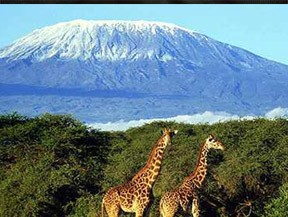How fit do you need to be to climb Kilimanjaro?
During my many treks up and down UK mountains with participants, I often hear misconceptions about Kilimanjaro. It's on the bucket list of just about every trekker I've ever met, yet I often hear things like, "I want to build up my fitness for Kilimanjaro" or "I'd never be fit enough to climb Kilimanjaro." While Kilimanjaro is certainly much higher than anything we face in the UK, it's not physically any harder.
In fact, I would rank the physical difficulty level of Kilimanjaro as equal or slightly less than that of the Yorkshire 3 Peaks or the National 3 Peaks. I even wrote a previous blog comparing the difficulty of these two challenges – "What's tougher?" However, Kilimanjaro has nothing on The Welsh 3000s, which is definitely the toughest trekking challenge we organise.
Now, you might have noticed I used the word "physically" when comparing the challenges, and that is because there are other components for Kilimanjaro that make it a different sort of challenge altogether. From a physical aspect, if you can complete the National 3 Peaks, I have no doubt that you have the walking strength to reach the summit of Africa's highest peak.
Acclimatisation to the altitude, however, is a different story and ultimately the key factor for successfully reaching the top of Kilimanjaro. The speed at which we acclimatise to height differs from person to person, and it has no correlation to fitness levels. Therefore, trekking too fast, which normal walking speed is considered to be, has the most damaging effect on participants' chances of summiting.
This oddly puts people at a higher level of fitness at greater risk of moving too fast in the beginning and suffering from altitude sickness later in the trek. For me, patience is the key for this challenge. You need to walk very slowly, even when it feels ridiculously easy, and you must ensure you drink plenty of water.
It's not my intention to paint this challenge as easy because that's certainly not the case. There are other factors to consider in addition to fitness and altitude adaptation, including trekking experience, camping on the mountain, and equipment selection. I am also not suggesting that fitness training shouldn't be a key part of preparation for Kilimanjaro; it is absolutely essential to be in good physical and healthy condition.
My point is solely that Kilimanjaro is achievable for anyone with a reasonable level of fitness and that the trek is no more physically demanding than our popular UK-based 3 Peak Challenges. So, don't let any misconceptions hold you back from tackling this incredible adventure!

